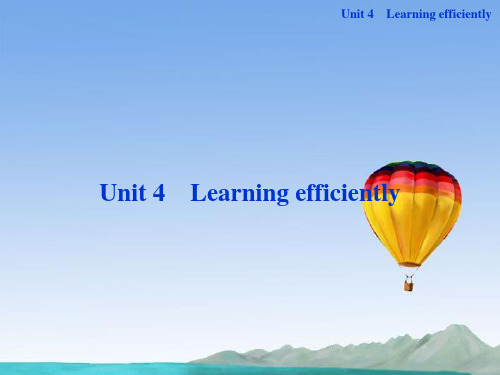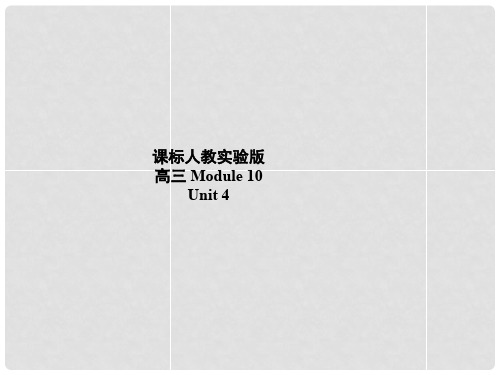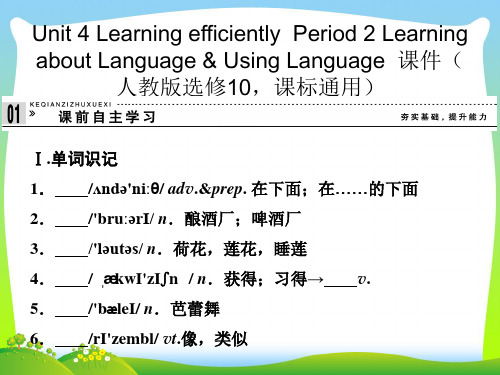Unit 4 Learning efficiently 教学设计 3
(湖北专用)高中英语 Unit4 Section Ⅰ Learning efficiently精品课

5 .Why does the author cite( 引 用 )Francis
Bacon’s words?___C____ A.Because Francis Bacon is well known to
the readers. B . Because the readers are interested in Bacon’s words. C.Because the author wants to use Bacon’s
4.A good reader doesn’t need to understand
9.____________every word in a text.
Part 4
Summary of how to become a 10.___su__cc_e_s_s_fu__l reader.
►Step Three:Summary The key to success lies in 1. f_r_e_q_u_e_n_t_____practice and certain correct techniques.The same principle applies to a 2. _c_o_m_p__et_e_n_t___reader.Here are some 3. __e_ff_i_c_ie_n_t____methods of reading.First of all,
before reading in 4. _d_e_t_a_il_______ , good
readers 5. __p_r_ev_i_e_w_____the text , such as
learning a few of the new words , asking himself what the
英语:Unit 4Learning efficiently-Listening课件 新人教选修10

Listening on P75
1. Discuss these questions briefly with others in your group.
1). What makes a good talk? Prepare a talk by listing the things to be talked about. When you present your talk, first tell your audience what you're going to talk about. Then say it. Finally, sum up what you’ve said.
5). If only you _k_n__ew__John as well as I do. (know)
6). I insist that you _b_e_quiet. (be) 7). It is necessary that you _k_e_e_p_
your safety belt on at all times. (keep)
2).The teacher recommended that they preview the questions before reading the text.
3).The car is so old I wouldn’t be surprised if it were to fall to pieces before we get there.
2). What things should you NOT do when giving a talk? You should not write down every thing you want to say and read it aloud to your audience.
英语:Unit 4Learning efficiently-Listening课件 新

1).What is Han Tao’ talk going to be about? His talk is about stamp collecting as a hobby.
2). What has Han Tao done so far to prepare his talk?
He has made a list of the things he wants to talk about.
You can hike close to home or travel to other places. You can hike in the mountains, in a forest, or along a river. You can also go for a hike in the city.
2). What things should you NOT do when giving a talk? You should not write down every thing you want to say and read it aloud to your audience.
2. Han Tao has to give a talk to his English class. He knows what he wants to say but he doesn’t know the best way to present his talk. His neighbor, Mrs Jones, is giving him some advice. Listen and answer these questions.
•Don’t read your speech. •Make eye contact with the audience and use a conversational tone. •Make notes to remind you of what to say.
高中英语 Unit 4 Learning efficientlyListening课件

3. Taking notes.
•Say what you are going to talk about, say it and then summarize what you said. •Write topics on the board. •Use visuals if possible •Hand out examples after the speech so audience are not distracted.
1).What is Han Tao’ talk going to be about? His talk is about stamp collecting as a hobby.
2). What has Han Tao done so far to prepare his talk?
He has made a list of the things he wants to talk about.
The basic equipment you need for hiking is simple: good shoes, clothes and a backpack.
Hiking is fun and exciting, but you shouldn’t forget safety. Here are some basic tips for successful hiking: 1.Don’t hike alone. 2. Tell someone where you are going. 3. Bring water and a good map. 4. Watch out for dangers, such as spiders,
Unit 4 Learning efficiently Using Language 课件-优质公开课-人教选修10精品

A visual learner: 1. Write the new words down and stick it on the wall so you can see them everyday. 2.Try to memorize new words by reading an article. 3. Write the new words in a notebook. Put it in your pocket. Have a look at them whenever you are free.
An auditory learner: 1. Listen to the tape and sound them out. 2. Listen to the text with new words. 3. Work in pairs. One reads the new words and the other spells them. A tactile reader: 1.Write the new words down again and again until you know them. 2.Play the crossword. 3.Make a dictation by listening to the tape.
English movies, listened to English radio and learned English pop songs.
Task 1 Reading
1. Tick only the statements that you
think resemble your situation
Tactile learners learn
best through concrete
Learning efficiently-课件

③alike/similar ④is similar
4.tiresome adj. (1)使人疲劳的;令人厌倦的 His speech is really tiresome.他的演讲实
在令人厌倦。 (2)讨厌的,烦人的
She can be a very tiresome child at times. 她这孩子有时会很烦人的。
【归纳拓展】 tiresome 用于修饰人或事,作定语或表语。 tire vt.& vi.使……疲劳,疲倦 tired adj.困倦的;疲倦的(指人的感觉) be/get/become tired of sth/doing sth/sb 对某事/做某事/某人不耐烦或感到厌倦 tired out 筋疲力尽 tiring adj.令人疲倦的(多指工作、旅行等事物) some 是一种后缀形式,用于构成形容词。
in any relationship.
答案 ①composition ②component ③
component
1.tend to(do sth)易于,往往会(做某事) He's a good salesman,but his offhand manner does tend to put people off. 他是个很好的推销员,可是他那随便的态 度容易使人产生反感。
It is not easy to acquire a knowledge of painting.
学画画不是件容易的事。
Some smoking and alcoholic drinks are an acquired taste and are not inborn. 抽烟喝酒往往是一种后来习得的嗜好,并不 是生来就有的。
【归纳拓展】
- 1、下载文档前请自行甄别文档内容的完整性,平台不提供额外的编辑、内容补充、找答案等附加服务。
- 2、"仅部分预览"的文档,不可在线预览部分如存在完整性等问题,可反馈申请退款(可完整预览的文档不适用该条件!)。
- 3、如文档侵犯您的权益,请联系客服反馈,我们会尽快为您处理(人工客服工作时间:9:00-18:30)。
Unit 4 Learning Efficiently 教学设计Period OneⅠ. Aim:Learn to read;Reading strategies;Auditory, Visual, TactileⅡ. Contents:一、Warming up1. allocate something to doing2. Divide Ss into groups with four in each3. Discuss the following questionsWhat does the graph tell you about the study habits of Guo Qiang?Do you think Guo Qiang is spending an appropriate amount of time on each aspect ofhis English study?Do you think a survey of your classmates would show similar results?4. Talk about you r partner’s English study habits二、Pre-reading1. Think about the techniques you use when you read Chinese texts of different kinds.2. Discussion:What is the first thing you do when you are given a text to read?When you start reading the text in detail do you think about the content?Suppose you were on holiday and you had a really good novel that you had been looking forward to reading. Would you read it quickly or slowly?Suppose your teacher asked you to find out about the planet Mrs. You have found a book on thesolar system. Would you read the whole book or just the part about Mars?Do you read the newspaper in the same way as you read a novel? Do you read a recipe and a cookbook in the same way?Supposing you had just bought a new DVD player. Would you read the instruction booklet from beginning to end or would you look at the contents page and then read only what you needed to know?3. Questions:What techniques do you think you use when you are reading English texts?4. Discussion:What do you think the passage will talk about?Period TwoⅠ. Aim:Reading comprehensionReading skillsParagraphingⅡ. Contents:一、Listening to the tape:二、Answering questions:How to become a successful reader?三、Summary:Give each paragraph a general idea.四、Language study:1. apply to2. competent3. be frustrated4. involve5. suppose6. interest/astonish/surprise/amaze7. glance at8. digest9. beneath10. It’s up to somebody to do something五、comprehendingThe techniques of good readers:1. Practice makes perfect.2. Make your reading practice enjoyable.3. A good reader reads in different ways depending on the purpose for reading.4. A good reader doesn’t need to understand every word in a text.5. A good reader reads actively not passively.Exercises:1. Complete the sentences in your own words:2. Work in groups and discuss the best way to read in the following circumstances. Write down the steps you would take in the correct order.Period ThreeⅠ. Aim:using languageLearner-centered strategiesTask-based practiceⅡ. Contents:一、Complete the following texts with words below in the correct form.二、Practice working out the meaning of words using the context. Read the sentences and work out the meaning of the words printed in bold.三、Revising useful structuresComplete the sentences using the subjunctive mood in the object clauseRead the conversation and underline the use of the subjunctive moodDiscuss the following questions in your groups, using the subjunctive mood.四、Using languageTake this quizI would rather hear a book on a cassette than read it.When I am doing my homework, I like to hear music in the background.When I go shopping, I would rather rely on a written list than on my memory.I like playing sports more than watching them.It is a struggle for me to keep my room or desk tidy.Now follow the instructions below to find out what kind of learner you are.Now turn the page to find out more about how you learn best.五、Three kinds of learnersVisual learnersAuditory learnersTactile learners六、DiscussionWhat result did you get from the quiz? Do you agree or disagree with the result? If you disagree, What kind of learner do you believe you are? Give reasons.What kind of activities have you found most useful when learning new English words?Do these activities suit the type of learner you are?Make a list of activities for learning new vocabulary for each of the three types of learners.七、ListeningListen to the tapeQuestions:What kind of learner is Annie?Why does Annie listen while she reads?Does Annie always expect to listen to reading passages?What else is Xiaozhou having problems with?Period FourⅠ. Aim:Learn to writeWay of wordStylesⅡ. Contents:一、Email reading二、Way of writing an email三、Write an email, following the steps below1. In Donghua’s email, underline the problems she has. Then list some things she could do to help with the problem.2. Read the list and pick out 2 or 3 suggestions for each of her problems.3. Read Donghua’s email again and decide how you should begin your reply. Try to be sympathetic about her problem.4. Write your opening and then write your suggestions. Then read what you have written and finda suitable way to end the email. Perhaps you can write something to encourage her to keep trying.四、Summing up1. Describe three different ways of learning that you have read about in this unit.2. List the things that interest you most.3. Useful words4. Useful expressions5. Complete the following sentences using the subjunctive mood五、Learning tips1. What did you learn from the unit?2. Intensive reading3. Grasp the main idea4. What do you think your classmates should pay attention to in learning English?。
